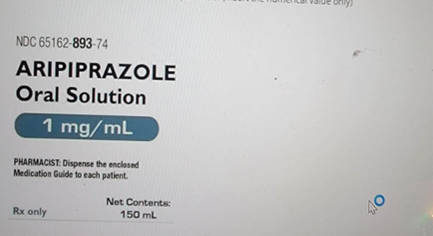Order: Aripiprazole 15 mg PO q24hr
Available: Refer to the med label below
How many milliliters will you administer per dose? (Insert the numerical value only)

The Correct Answer is ["15"]
Desired dose = 15 mg
Available concentration = 1 mg per 1 mL (or 1 mg/mL)
Volume to administer (mL) = Desired dose (mg) / Available concentration (mg/mL)
= 15 mg / 1 mg/mL
= 15 mL
Nursing Test Bank
Naxlex Comprehensive Predictor Exams
Related Questions
Correct Answer is D
Explanation
A. They inhibit the metabolism of alcohol in the liver: Benzodiazepines do not affect alcohol metabolism. Enzymes like alcohol dehydrogenase and aldehyde dehydrogenase are responsible for metabolizing alcohol, and benzodiazepines have no role in this process.
B. They block the reuptake of dopamine in the central nervous system: This mechanism is more characteristic of stimulant drugs like cocaine or certain antidepressants. Benzodiazepines act primarily on GABAergic pathways and do not target dopamine reuptake.
C. They have no potential for abuse or dependence: Benzodiazepines carry a well-documented risk of dependence and abuse, especially with long-term use or in individuals with a history of substance use disorders. Their use in alcohol withdrawal is carefully managed due to this risk.
D. They enhance the effects of GABA in the central nervous system: Benzodiazepines potentiate GABA, the brain’s primary inhibitory neurotransmitter, which helps to stabilize the CNS, reduce seizures, and manage agitation during alcohol withdrawal. This GABAergic action compensates for the decreased inhibitory tone seen in alcohol-dependent individuals during withdrawal.
Correct Answer is D
Explanation
A. Respiratory arrest and coma: These are late, life-threatening manifestations of local anesthetic systemic toxicity (LAST) that occur after CNS and cardiovascular collapse. Recognizing early signs is critical to preventing progression to this severe stage.
B. Ventricular arrhythmias and cardiac arrest: These are also late signs of LAST, resulting from the anesthetic’s depressant effects on cardiac conduction. By the time these occur, toxicity is advanced and may require immediate resuscitation measures.
C. Hypotension and tachycardia: Although cardiovascular symptoms may eventually develop, they are typically preceded by neurological signs. Early identification and management of CNS symptoms can often prevent progression to cardiovascular compromise.
D. Tinnitus, metallic taste, and perioral numbness: These are classic early signs of LAST and indicate CNS involvement. They often occur within minutes of administration and should prompt immediate intervention to stop drug absorption and initiate supportive care.
Whether you are a student looking to ace your exams or a practicing nurse seeking to enhance your expertise , our nursing education contents will empower you with the confidence and competence to make a difference in the lives of patients and become a respected leader in the healthcare field.
Visit Naxlex, invest in your future and unlock endless possibilities with our unparalleled nursing education contents today
Report Wrong Answer on the Current Question
Do you disagree with the answer? If yes, what is your expected answer? Explain.
Kindly be descriptive with the issue you are facing.
